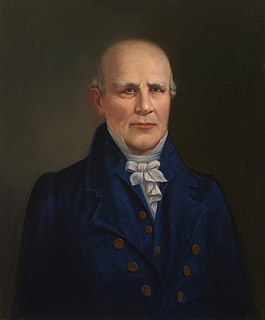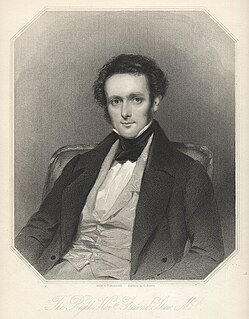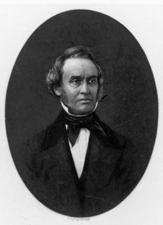
Sir William Rowan Hamilton LL.D, DCL, MRIA, FRAS was an Irish mathematician, astronomer, and physicist. He was the Andrews Professor of Astronomy at Trinity College Dublin, and Royal Astronomer of Ireland, living at Dunsink Observatory.

Nathaniel Macon was an American politician who represented North Carolina in both houses of Congress. He was the fifth speaker of the House, serving from 1801 to 1807. He was a member of the United States House of Representatives from 1791 to 1815 and a member of the United States Senate from 1815 to 1828. He opposed ratification of the United States Constitution and the Federalist economic policies of Alexander Hamilton. From 1826 to 1827, he served as President pro tempore of the United States Senate. Thomas Jefferson dubbed him "Ultimas Romanorum"—"the last of the Romans", like Flavius Aetius.

Earl of Haddington is a title in the Peerage of Scotland. It was created in 1627 for the noted Scottish lawyer and judge Thomas Hamilton, 1st Earl of Melrose. He was Lord President of the Court of Session from 1616 to 1625. Hamilton had already been created Lord Binning in 1613 and Lord Binning and Byres, in the County of Haddington, and Earl of Melrose, in the County of Roxburgh, in 1619. These titles were also in the Peerage of Scotland. The title of the earldom derived from the fact that he was in possession of much of the lands of the former Melrose Abbey. However, Hamilton was unhappy with this title and wished to replace it with "Haddington". In 1627 he relinquished the earldom of Melrose and was instead created Earl of Haddington, with the precedence of 1619 and with limitation to his heirs male bearing the surname of Hamilton. This derived from the fact that he considered it a greater honour to take his title from a county rather than from an abbey. Hamilton was a member of the prominent Scottish family of that name and descended from John de Hamilton, younger son of Walter de Hamilton, who was granted the feudal barony of Cadzow and who is also the ancestor of the Dukes of Hamilton and Dukes of Abercorn.

Edward Palmer was a Canadian politician born at Charlottetown, Prince Edward Island and resided in Prince Edward Island until his death. He is considered one of the Fathers of Canadian Confederation, despite his opposition to Confederation, as he was a delegate to both the Charlottetown and Québec Conferences.

Nicholas Aylward Vigors was an Irish zoologist and politician. He popularized the classification of birds on the basis of the quinarian system.
Billy Caldwell, baptized Thomas Caldwell, known also as Sauganash, was a British-Potawatomi fur trader who was commissioned captain in the Indian Department of Canada during the War of 1812. He moved to the United States in 1818 and settled there. In 1829 and 1833 he negotiated treaties on behalf of the United Nations of Chippewa, Ottawa and Potawatomi with the United States, and became a leader of a Potawatomi band at Trader's Point. He worked to gain the boundary long promised by the British between white settlers and Indians, but never achieved it.

William Nelson, 1st Earl Nelson, 2nd Duke of Bronte, was an Anglican clergyman and an older brother of Horatio Nelson, 1st Viscount Nelson.

George Alexander Hamilton was a minor British Conservative Party politician and later a prominent civil servant. He was an extremely zealous and active Protestant and a supporter of the Orange Order.

Sir Frederick Shaw, 3rd Baronet was an Irish Conservative MP in the United Kingdom Parliament, and a judge.

Robert Rantoul Jr. was an American lawyer and politician from Massachusetts.

Lewis Davis Campbell was an American politician as a U.S. Representative for Ohio. Over his political career he was elected as a Whig, Republican, Know Nothing, and Democrat.
Nineteen baronetcies have been created for persons with the surname Hamilton, eight in the Baronetage of Nova Scotia, one in the Baronetage of England, five in the Baronetage of Ireland, one in the Baronetage of Great Britain and four in the Baronetage of the United Kingdom. As of 2008 two creations are extant, two are dormant, two are either extinct or dormant and twelve extinct.
Samuel Clark was an American lawyer and politician. He served as a U.S. representative for both New York and Michigan.

Richard Daft was an English cricketer. He was one of the best batsmen of his day, the peak of his first-class career being the 1860s and early 1870s.
Walter Coles was a Virginia planter, military officer and Democratic politician who served in the Virginia House of Delegates and in the U.S. House of Representatives.

Nathaniel Briggs Borden was a businessman and politician from Fall River, Massachusetts. He served as a U.S. Representative from Massachusetts's 10th congressional district from 1835 to 1839 and again from 1841 to 1843. He later served as a member of the Massachusetts General Court, first as a state Senator, and later a state representative. He also served as the third mayor of Fall River. His business career included interests textile mills, banking and railroads. He was the younger brother of noted land surveyor Simeon Borden.
John Hamilton Reynolds was an English poet, satirist, critic, and playwright. He was a close friend and correspondent of poet John Keats, whose letters to Reynolds constitute a significant body of Keats' poetic thought. Reynolds was also the brother-in-law of the writer and humorist Thomas Hood, who was married to his sister Jane.
John Marshall Clemens was the father of author Mark Twain.
Elisha Wesley McComas was a Virginia lawyer and politician who served as the second Lieutenant Governor of Virginia in 1856 and 1857 under Governor Henry A. Wise, but resigned because of the administration's handling of John Brown's raid on Harpers' Ferry.
Henry Wilmot Ormsby PC, QC was an Irish lawyer and judge.












